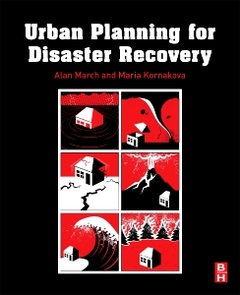Urban Planning for Disaster Recovery
Coordonnateurs : March Alan, Kornakova Maria

Urban Planning for Disaster Recovery focuses on disaster recovery from the perspective of urban planning, an underutilized tactic that can significantly reduce disaster risks. The book examines disaster risk reduction (DRR), in particular, the recovery stage of what is widely known as the disaster cycle.
The theoretical underpinning of the book derives from a number of sources in urban planning and disaster management literature, and is illustrated by a series of case studies. It consists of five sections, each of which opens with a conceptual framework that is followed by a series of supporting and illustrative cases as practical examples. These examples both complement and critique the theoretical base provided, demonstrating the need to apply the concepts in location-specific ways.
Alan March, Maria Kornakova and Jorge Leon
2. The Governance of Urban Recovery
John Handmer
3. More than a Roof Overhead: How Just Building Housing Limits Effective Disaster Recovery
Esther Charlesworth
4. When Systems Break Down: The Role of International Aid and Humanitarian Response
Thomas Bamforth
5. From Recovery to Prevention: The Swiss Avalanche Program
Maria Kornakova and Alan March
6. Equality in Recovery
Janet Stanley
7. Finance, Insurance and Facilitation of Recovery: Christchurch, New Zealand
Sarah-Alice Miles
8. Reconstruction of Informality: Can Formal Reconstruction Recreate Informality?
Mojgan Taheri Tafti
9. Reconstructing Vulnerability after the Germany Floods: Oil Damage and Recovery
Christine Wamsler and Mark Kammerbauer
10. The Victorian Bushfires in Australia: Between New Regulation and Political Reality
Alan March and Maria Kornakova
11. Rebuilding or Repositioning: Lessons for Sandy, New Orelans, and Elsewhere
Edward Blakely
12. Housing Resilience in the Developing World
Iftekhar Ahmed
13. 10 Years of Great Love - The Evolution of Housing Reconstruction in Banda Aceh
David O'Brien
14. Grassroots Approaches to Recovery: Learning from Community
Kate Cotter
15. Conclusions: Planning for When the Best Plan is Overcome
Alan March, Maria Kornakova and Jorge Leon
Maria Kornakova, PhD, graduated from the Melbourne School of Design, University of Melbourne. Her PhD research explored the potential to increase and improve the role of urban planning in decreasing disaster risks. Upon submission of her PhD she continued to work at the Melbourne University as a postdoctoral fellow for the project “The Disaster Risk Reduction in the Built Environment." Currently, Maria holds a postdoctoral fellow position for the project “Governance and the Risk-Resilience-Sustainability Nexus at Massey University, New Zealand. Her research is focused on developing applied research that can build understanding and capability to bridge the risk-resilience-sustainability nexus. Originally from Uzbekistan, Maria obtained her BA in Architecture from Tashkent Institute of Architecture and Construction, and MA in Urban and Regional Planning from Michigan State University under a Fulbright Scholarship.
- Examines disaster recovery from an urban planning perspective
- Illustrates key concepts with real-world case studies
- Explores the contributions of experts, urban planners, NGOs, and community members
Date de parution : 05-2017
Ouvrage de 274 p.
19x23.3 cm
Thèmes d’Urban Planning for Disaster Recovery :
Mots-clés :
Aceh; Adaptability; Adaptation; Avalanche zoning; BMO; Build back better; Building back better; Bushfire/wildfire planning policy; Bushfire/wildfire regulatory controls; Bushfire/wildfire risk reduction; Cash transfer programming; Climate change; Clusters; Collective action; Community advocacy; Developing countries; Disaster management; Disaster proofing; Disaster recovery; Disaster repositioning; Disaster risk reduction; Disaster; Disasters; Displacement; Equity; Gender; Governance; Grassroots


